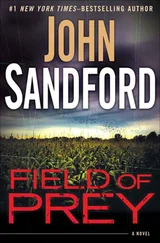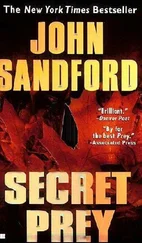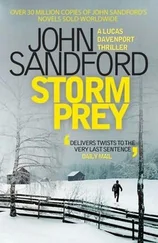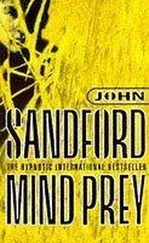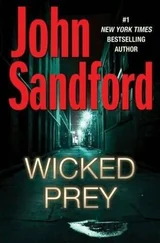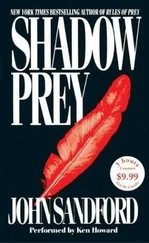“At twenty miles an hour, how long does it take to go one-point-four miles?” Del asked.
“You’d go a mile in three minutes,” Lucas said. “You’d go the rest of the way in four-tenths of three minutes. Three minutes is one hundred and eighty seconds, and one-tenth of that is eighteen seconds. Four-tenths would be seventy-two seconds. So, four minutes and twelve seconds.”
“How big a grave can you dig in four minutes and twelve seconds?”
“Don’t have the math on that one,” Lucas said.
• • •
AT A LITTLE MORE than 1.3 miles on Lucas’s odometer, they saw the road going left, which looked like a darker tunnel on a black sheet. Jenkins pulled off to the left side of the road, Lucas edged off behind him, and the others followed. They all climbed out into the cold night, and Lucas whispered, “No talking. This guy might have experience night-fighting. Spread out, don’t shoot each other. Stay on the road. No noise.”
The four men moved off, spread across the road like gunfighters in an old spaghetti western; and, Lucas thought, they were gunfighters, every one of them. Jenkins was the lead man, with two to his left, one to his right, in a V, like a bunch of Canada geese headed south.
Lucas was counting steps. Two hundred and eighty slow steps down the road, and they could hear Dannon working, the rhythmic chh! chh! chh! chh! of a spade digging into damp earth, but they couldn’t see him.
• • •
WHEN DANNON WAS IN the army, he’d served as company level and battalion level intelligence officer. In the latter job, in Afghanistan, he’d serviced a dozen sources in villages scattered around the forward operating base. They would call into the cell number and leave messages, which the native translator would render into English. Most of it was inconsequential—this guy or that guy had come or gone, and he was Taliban or an Arab or whatever. Arabs were always interesting, because they were rare and sometimes important. Most times, they were kids from Saudi or Jordan looking to make their bones, wandering across the landscape like itinerant skateboarders; but sometimes interesting. The Americans usually tried to pick up the Arabs.
The actual pickups were done by special ops people. Dannon had gone along on a number of the operations, when there was space available—the commander encouraged staff people to get out in the weeds—and had twice been involved in firefights with the targets. Both times, they’d been kids, and both times, killed.
But.
Except for the fights themselves, it had always been high-tech: sources fingering the targets, live calls when a target was leaving a village, tracking them from gunships, then closing them down.
He’d never used a GPS tracker, and it never occurred to him that there might be one on his truck. He’d never been tailed, and though he’d watched his rearview mirror, looking for cars that were pacing him, it never occurred to him that cars that overtook him and disappeared in the distance were the watchers. He’d never thought that night-vision goggles could be used against him.
He’d never been snuck up on in the dark.
But.
He’d sat on nighttime ambushes, every sense digging into the dark, and as he dug Carver’s grave, that was operating on some level. At one point, a few minutes after he started digging into the reeds in the swampland, he picked up what seemed to be a vibration. He stopped digging and walked out to the road, and peered in the dark toward the turnoff. Nothing but darkness.
He turned back, navigating with a taped flashlight, a thin needle of light showing him the path.
He worked for another five minutes, and then felt another chill. What was that?
There was no specific noise, other than the engines from the interstate, a mile away, but there was something under that . . . an unidentifiable pattern . . .
He didn’t feel foolish at all: the special ops people always had said that when you had a feeling, pay attention to it; most times, it was nothing. The other time, if you hadn’t paid attention, it would kill you. So he paid attention, sitting, no longer digging. The burial site, near where they’d put Tubbs down, was off a gravel track, down a path that led to the river, and then off the path fifteen yards.
Lots of zigs and zags.
He was invisible, he thought. He sat, listening, listening . . .
And heard the crunch of gravel.
No. Imagined he heard the crunch of gravel? He wasn’t sure. He slipped his gun out of its holster, pressed the safety forward.
Duckwalked out to the path to the river.
• • •
A MINUTE OFF THE TRACK, Lucas felt Del’s arm slow him down, and pull him in. They bunched up and Jenkins whispered, “His truck is twenty-five or thirty feet in front of us. I think he’s off to the right, right by the truck.”
Lucas said, “Keep the lights handy. Light him up if you see him.”
They moved on, up to the truck; and then a few steps beyond. Lucas heard the crunch of gravel and put out a hand to Del, who was to his left, stopping him in his tracks. Del did the same, to Jenkins, and Jenkins to Shrake. They all froze, and listened, peering into the blackness.
Three of them could see nothing; but there was some kind of faint, faint noise coming from the front. Jenkins saw Dannon edge into the path, a gun in his hand.
Jenkins had his flashlight in his left hand. He pointed it at Dannon’s eyes, pointed his pistol, and without warning, turned it on.
Dannon was there, thirty feet away, pinned by the dazzling light like a frog on a tenth-grader’s dissection tray. Unlike those frogs . . .
Jenkins shouted, “Freeze, freeze or we’ll shoot.”
. . . Unlike those frogs, Dannon leaped sideways back into the swamp reeds and then, scrambling on his hands and knees, still clinging to his pistol, began running mindlessly through the brush.
The cops all turned on their lights and played them through the brush, and caught flashes of Dannon, the movement of the swamp weeds and brush as he tore through them, and Lucas shouted, “Jenkins, Shrake, Del, go after him, take care, take care . . .”
Lucas turned and in the light of his own flash, ran back up the dirt track toward the gravel road, pulled his handset and said, “Sarah, Jane, he’s coming right at you. Watch out, watch out, he’s on foot, I think he’s coming for the road. . . .”
• • •
NOTHING AT ALL WENT through Dannon’s head. He’d had some escape and evasion classes, and one of the basics was simply to put distance between yourself and your pursuer. Distance was always good; distance gave you options. He didn’t think about it, though, he just ran, fast and as hard as he could, and he was in good shape.
Good shape or not, he fell three or four times—he wasn’t counting—and the small shrub and grasses tore at him and tried to catch his feet; he went knee-deep into a watery hole, pulled free, and ran on, looking back once. He was out of the light, now, he was gaining on them, he was almost there . . .
And he broke free into the road. He couldn’t see it, except as a kind of dark channel in front of him. The lights were now a hundred yards back, but still coming, and he ran down the dark channel. When he got far enough out front, he’d cut across country again, and then maybe turn down toward the river. . . .
He ran a hundred yards down the channel, heedless of the sounds of his footfalls, breathing hard. . . .
• • •
LUCAS WAS ON THE ROAD, moving faster than Dannon, but at the wrong angle—Dannon, though in the swamp, was cutting diagonally across the right angle of the gravel road and the dirt track. Lucas could tell more or less where he was because of the brilliant lights of the cops behind him, and the sound of Dannon’s thrashing in the brush. Then the thrashing stopped, and Lucas stopped, trying to figure out where he’d gone.
Читать дальше

